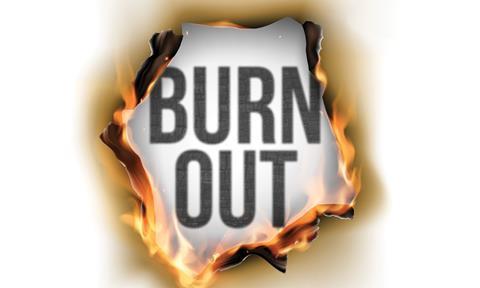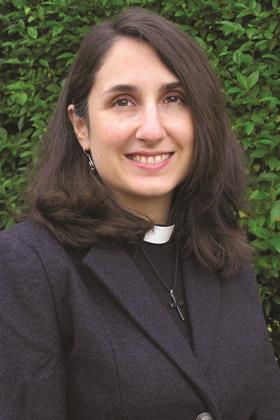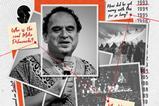A record number of church leaders are thinking about quitting ministry. Megan Cornwell speaks to the pastors experiencing burnout to find out why the spiritual health of the Church is under attack

Pastor Pete Killingley was rundown and ready for his forthcoming sabbatical when Covid-19 hit. “I can just about get there,” he had previously warned his eldership team, “but I’m gonna limp over the finish line.” When the country ground to a halt in March 2020 and the media scrambled to understand a deadly new virus, thoughts of a much-needed ministry break began to dissipate. His congregation were looking to him for reassurance and support, so he sprang into action.
In the disorientating early months of the pandemic, when church services moved from in-person to online, the then 36-year-old leader of a 70-strong evangelical church in Surrey suddenly found himself “doing everything”. Speaking to me over Zoom from the home office that became church for a time, Killingley explains: “I’m quite tech-minded so, in many ways, I quite enjoy the tech side of things. But at the same time, there was lots to do.” From recording worship songs with his wife to editing service contributions and live-streaming his sermon, overnight, the Killingleys became responsible for teaching, preaching, leading worship, tech support and pastoral care. Simultaneously, they were home schooling their two autistic children during lockdown.
In between sips of Coke, Killingley tells me that adrenaline powered him through the initial crisis-response. But when his church reopened six months later, he sensed his reserves were dangerously depleted. “There were a thousand questions that you never had to think about before,” he explains, referring to the swathes of government guidance he was then wading through to understand how social distancing and tier systems applied to his church. “It’s not just the time it took to work through the decisions, it’s the mental energy to process it all. I would get to Friday and think: I feel like I’ve worked a full week and now I’ve got to start thinking about the sermon. If you have that week after week, it adds up and drains you.”
Emotionally and mentally exhausted from pivoting through a foreign and ever-changing landscape, Killingley eventually took his sabbatical in summer 2021, but says he just crashed. For the first time in his six and a half years as a pastor, he began to question his calling: “I couldn’t imagine myself doing anything else, and I can’t imagine myself really going to another church, but I very much felt: Can I go back? Am I able to go back?”
When he caught Covid just days before Christmas that year, putting paid to his family’s festive celebrations and throwing into confusion the church services he had planned, it was the final blow. “When I came back in January [2022], I had a panic attack. I was feeling agitated, stressed and unable to do anything except lie in bed.” Completely burned out, Killingley reduced his working hours by half, stepping back from everything but preaching.
The four signs of burnout
1. Are you emotionally fatigued? Not just a little tired but deep exhaustion that goes all the way to your bones? A few days off will not cure this fatigue.
2. Do you have a diminished sense of accomplishment? You may be doing the same work but everything feels harder and you just aren’t getting the results you used to. Work that used to bring you joy, now drains your soul.
3. Have you lost your sense of self? You have forgotten what you enjoy, what you value, or why you do your work? You just don’t recognise the person in the mirror?
4. Are you feeling hopeless? You’ve lost your optimism? You don’t see how change is possible? You feel stuck – maybe forever?
If you answered “yes” to all four questions, you are probably in burnout. The good news is that it’s possible to work your way out.
The above list was compiled by Sean Nemecek, whose book on burnout will be available from Zondervan next year. A podcast co-hosted by Nemecek, which covers some of the issues raised in this feature, including what to do if you’re experiencing burnout, is available here.
MENTAL AND EMOTIONAL BURNOUT
The World Health Organization defines burnout as “a syndrome conceptualised as resulting from chronic workplace stress that has not been successfully managed”. It is characterised by feelings of exhaustion, increased negativity towards one’s job and reduced professional efficacy. Although it’s difficult to know how many pastors it affects, a Church of England wellbeing survey found that 42 per cent of clergy said their mental health deteriorated during the pandemic. Recent research from thinktank Barna reveals 34 per cent of American pastors considered quitting during 2021.
“I don’t know anybody that wasn’t affected by it,” says David Holden, leader of New Ground, part of the Newfrontiers network of churches, when I catch up with him over Zoom to discuss the impact of the pandemic on church leaders in the UK. “It didn’t matter how long you’d been in pastoral ministry, how much experience or training you had, what your personality was, what size of church it was, I was surprised by how it really did affect people.”
Holden, like others I speak with, says the last three to four months have been the hardest: “I describe it as coming out of the cinema and into the bright light. You got so institutionalised and conditioned to this rather darker place. I know leaders who have found preaching on Sunday more taxing than ever before, and they used to do it without thinking.”
Holden’s assessment is echoed by Marcus Honeysett, the analytical and straight-talking Living Leadership director and author of Powerful Leaders? When church leadership goes wrong and how to prevent it (IVP). He tells me not one of the ministers he mentors is currently in a positive frame of mind, and that even pre-pandemic, he estimated burnout to be as high as 40-45 per cent. Traditionally, the danger point in ministry comes at the two pastorates’ mark, or 15 years in, he warns.
BURNOUT WAS PREVALENT BEFORE 2020. COVID SIMPLY PUSHED MANY OVER THE PRECIPICE
Honeysett believes all the factors that have driven pastors to exhaustion in the past have been magnified by the pandemic – long hours, poor work/life balance, competing demands (elderly parents and/or young children), declining energy levels, lack of support from peers, isolation and discouragement. What’s more, the Covid crisis turned leaders into shock absorbers for “the trauma of the flock” and into “content producers as opposed to shepherds”. In addition, the various – and sometimes critical – opinions about the Church’s response to legislative changes were directed straight at those steering the ship through choppy waters.
This reminds me of something Killingley said to me. The notion that “we’re all in this together”, which characterised the early months of lockdown, has now given way to: “I wouldn’t have made that decision and I’m going to let you know,” he says. “And also, a lot of people are quite angry at the government, at life or at God, but there’s not many outlets for that. One way that they can express their anger and frustration is towards their church leadership… you almost feel that you’ve become a proxy for people’s frustrations…that wears you down.”
SPIRITUAL BURNOUT
“Burnout is so complex there are any number of factors that could contribute to it,” explains Sean Nemecek, who has been working with ministers in crisis for a number of years. The gently spoken pastor-turned-coach believes that the condition of a leader’s relationship with God is more important than external factors. “When I’m talking with pastors, I usually say: ‘Burnout is what happens when our inner walk with God isn’t sufficient to sustain our outer work for God’…And so they have to learn to reprioritise their time with God, their relationship with God, their time in prayer, their times of rest and Sabbath, and that helps them to establish some rhythms that are sustainable for their work.”
But establishing a healthier pace and experiencing healing does not happen immediately. Nemecek says it takes most leaders two to five years to fully recover. But the good news is that if pastors are willing to recalibrate, there is every possibility they will become better, more resilient leaders in the long run: “We can look at this as a gift from God, in some sense, because it’s an invitation from God to be closer to him; to receive his love at a deeper, more relational, level. And then, out of our relationship with God, to be able to serve others with that sense of security rather than anxiety, with a sense of freedom rather than shame.”
Alongside his work coaching leaders, Nemecek also counsels churches to create environments in which pastors can flourish, something he believes is a crucial part of the picture. His recommendations include: helping ministers observe a day of Sabbath rest, providing space for monthly and yearly prayer retreats, and introducing sabbatical plans where they don’t already exist.
BURNOUT IS WHAT HAPPENS WHEN OUR INNER WALK WITH GOD ISN’T SUFFICIENT TO SUSTAIN OUR OUTER WORK FOR GOD
This list might seem obvious; surely paid pastors, of all people, have the time for devotion? Not necessarily, according to Honeysett, who believes overactivity is diverting the attention of leaders – and lay people – from the main business of worship and listening to God. “I think a lot is going to be revealed about unhelpful success metrics,” he says, pausing as the idea percolates. “Many of us think that vibrant, spiritual healthiness is demonstrated by a multiplicity of programmes…because we’re large, because we have small groups, because we do this, that or the other ministry. When in fact, we may have been using activity as a substitute for vibrant spiritual healthiness.”
If too much activity is impeding spiritual wellbeing, as Honeysett suggests, what’s the antidote? “Most churches say: what is the most we can do with the resources we have?” he adds. “I wonder whether we should be asking the opposite: what’s the least we can do?”
This idea is radical in its simplicity and something about it resonates, not least because of the challenges that Killingley and others have shared. Leaders say they feel discouraged that previously committed Christians in their churches are less engaged now. Volunteers have dropped off serving rotas and some are staying away from in-person services. Perhaps it’s not just shepherds suffering from weariness and looking for a gentler pace of life?
His words also bring to mind Nemecek’s view that prioritising time with God provides pastors with a greater ability to discern which activities to say yes to and which to say no to. Or as Martin Luther supposedly put it: “I have so much to do that I shall spend the first three hours in prayer.” Perhaps the answer to the problem of burnout lies somewhere between increased spiritual discipline and decreased activity.
As the pandemic comes to a close and freedom beckons, one question many of us are asking is: will life return to normal? There has been a lot of discussion – not least in the pages of this magazine – about what our churches could look like post-Covid. But after the pandemic wiped the slate clean, do we really want to return to the status quo?
What I’ve discovered from speaking with pastors and experts is that burnout was prevalent before 2020. Covid simply pushed many over the precipice. That raises the question: if many of our leaders – and by extension, our churches – are spiritually ill, what steps can we take towards convalescence?
Honeysett might be onto something when he suggests that, rather than rushing to fill serving rotas or to reimagine church, we wait on the Lord. That’s not an easy thing to do in a world that prizes performance over presence and which measures success by statistics. But, as Jesus told Martha when she complained that her sister wasn’t making food or tidying the house: “Mary has chosen what is better” (Luke 10:42). Mary was far more interested in sitting at the feet of her Lord and learning from the one whose yoke is easy and whose burden is light (Matthew 11:30). I have an inkling that, after such a time as this, it’s exactly the tonic we need, sheep and shepherd alike. Who knows what God might do with an offering like that.
‘I feel utterly burned out’

Dr Isabelle Hamley is theologian to the House of Bishops. She caught Covid-19 at the beginning of the pandemic and, two years on, is still unable to walk up the stairs without getting out of breath. Here, she explains how long Covid led to feelings of exhaustion and burnout
Even though, physically, I am getting slightly better, the feeling of being overwhelmed and burned out is actually getting worse. My initial being off work after I caught Covid was really about caring for myself physically, but I need to stop and catch up with myself to a degree, and there hasn’t been much space to do that.
As the long Covid symptoms continue, you just think: Is this going to be permanent? Is this a disability? And I need to then find space to come to terms with it. That’s quite a big thing for anyone to deal with. We don’t know whether anybody will find treatments that actually deal with the cause rather than the symptoms.
As the pandemic has carried on, everybody is exhausted, so the support networks that normally you draw on – they are struggling and trying to cope. There are less avenues for support and to help you process things. My mental health is very fragile at the moment. I started taking antidepressants a few months into Covid, because I just couldn’t process it all. I’ve now come off those, but I’m not sure whether it’s the right decision. I still feel incredibly fragile and that takes a toll and makes it harder to concentrate.
When you work in the Church, you naturally end up dealing with a lot of difficult situations – that’s part of the job – but I feel I have less emotional reserves to deal with conflict and distress in other people. I just haven’t got the capacity I used to have to hold all of that.
Isabelle has been working with the Clergy Support Trust and St Luke’s, a charity that helps clergy and their family when they are experiencing ill health, to explore how to better care for clergy with long Covid. Find out more at clergysupporttrust.org.uk





































